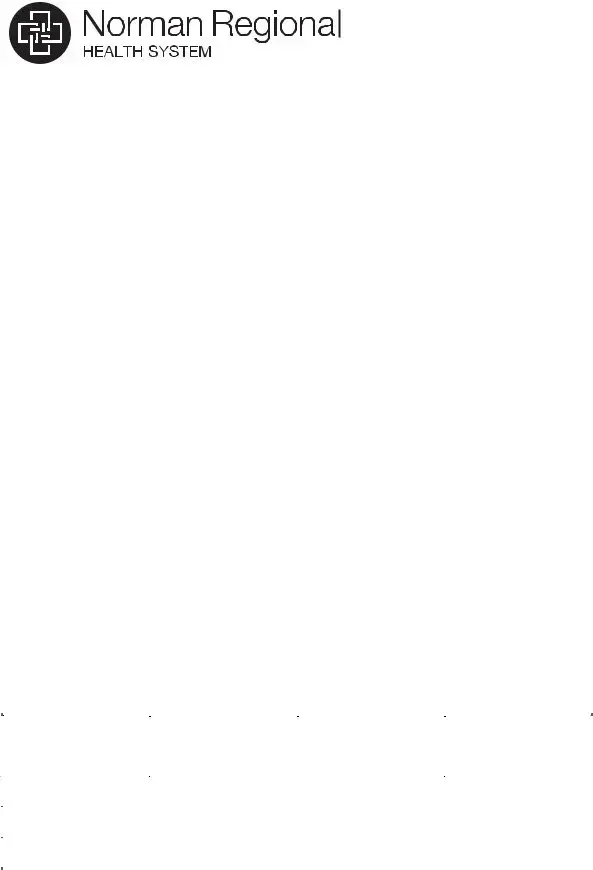FINANCIAL ASSISTANCE APPLICATION |
Patient Name _______________________ |
Applications without documentation will be denied. |
Account# __________________________ |
Automatic Qualifier (subject to verification)
If you receive one of the following benefits,
Fill out the Section 1a & c, sign the application and mail with documentation
▪FOOD STAMPS (applies to any household member)
Send a copy of your most current DHS food stamp verification letter. (Do not sent copies of food stamp cards or printouts of food stamp accounts)
▪MEDICAID/SOONERCARE (applies to any household member)
Send a copy of your Medicaid/SoonerCare letter or case number
▪SOCIAL SECURITY DISABLITY (applies only to the patient)
Send a copy of your Social Security Notice of Income letter
If you DO NOT receive any of the above benefits, please fill out the entire application and provide the following documentation.
NOTE: All documentation provided for this application is confidential. It is used exclusively for this application. Excluding the information needed to verify credit history, this information it is not shared with third parties or other NRHS departments.
HOUSEHOLD INCOME: Send written verification of your household’s income for the past twelve (12) months.
●Each household wage earner must be included. (not needed if the paycheck stub gives year to date earnings) PAYCHECK: Send a copy of the most current paycheck stub for each household wage earner.
CHECKING AND SAVINGS ACCOUNT: Send copies of your last three (3) months checking account statements or a 90 day printout showing transactions and balances, and a copy of your most recent savings account statement.
●If you DO NOT have a bank account, send a copy of your most recent mortgage/rent and utility receipt.
FEDERAL INCOME TAX RETURN Send a completed, signed copy of last year’s Income Tax Return for each household wage earner, include all schedules, W-2’s, and 1099’s.
●If you DID NOT FILE an income tax return for the last tax year, please provide IRS verification.
FULL TIME STUDENTS: Provide verification of enrollment and a copy of your Financial Aid Notification (FAN) letter. INTERNATIONAL STUDENTS, Send a copy of your Form I-20 provided to your college / university.
For Hospital Use Only
|
|
|
Approved: |
|
Approved: |
|
Approved: |
|
|
|
|
|
|
|
|
|
|
|
|
|
%: |
|
%: |
|
%: |
|
|
Determination: |
|
|
|
|
|
|
|
|
Date: |
|
Date: |
|
Date: |
|
|
|
|
|
|
(Initials Only) |
|
|
|
|
|
|
|
|
|
|
|
|
|
|
|
Denied: |
|
Denied: |
|
Denied: |
|
|
|
|
|
|
|
|
|
|
|
|
|
Date: |
|
Date: |
|
Date: |
|
|
|
|
|
|
|
|
|
|
|
|
|
|
|
|
|
|
|
Reasons:
________________________________________________________________________________________________________________
________________________________________________________________________________________________________________
920500005.0210 |
Page 1 of 4 |
1. HOUSEHOLD
a)APPLICANT (PARENT/GUARDIAN, IF PATIENT IS A MINOR):
FIRST NAME |
MIDDLE INITIAL |
LAST NAME |
SOC SEC# |
|
BIRTHDATE |
|
|
|
|
|
MAILING ADDRESS |
CITY, STATE, ZIP |
How long? |
Circle one |
Phone number: |
|
|
|
OWN RENT |
( |
) |
Previous Address, if at current address less than 1 year. |
|
|
|
|
|
|
|
EMPLOYER |
STREET ADDRESS: |
Start date , if less than 1 year |
|
|
|
(Month/Day/Year) |
|
|
|
|
|
Gross Monthly Salary: |
|
|
How often are you paid - circle one |
|
|
|
Monthly Bi-Weekly |
Weekly |
If Self-employed, complete the following line and submit proof of income:
Name of Business |
Street Address |
Phone Number |
b) SPOUSE: |
|
|
|
|
FIRST NAME |
MIDDLE INITIAL |
LAST NAME |
SOC SEC# |
BIRTHDATE |
|
|
|
|
EMPLOYER |
STREET |
ADDRESS |
Start date , if less than 1 year |
|
|
|
(Month/Day/Year) |
|
|
|
|
Gross Monthly Salary: |
|
|
How often are you paid? - circle one |
|
|
|
Monthly Bi-Weekly |
Weekly |
c)OTHER HOUSEHOLD MEMBERS HOUSEHOLD TOTAL: _________
NAME |
RELATION TO PT |
SOC SEC# |
MEDICAID OR CASE NUMBER |
|
|
|
|
|
|
|
|
|
|
|
|
|
|
|
|
|
|
|
|
|
|
|
|
Name of Nearest Relative (Not living with you) RelationAddressPhone Number
920500005.0210 |
Page 2 of 4 |
2. ASSETS:
BANK ACCOUNTS: If sending a printout, it must cover a 90 day period and show the running balance. If necessary, print in landscape mode. All but the last four digits of the account number may be blacked out.
Checking Account# |
Bank Name |
Current Balance |
|
|
|
|
|
Checking Account# |
Bank Name |
Current Balance |
|
|
|
|
|
Savings Account# |
Bank Name |
Current Balance |
|
|
|
|
|
PROPERTY (include primary residence, other residences, rental/business property, out of state property) |
Property Address |
County/State |
Type |
Current Market Value |
Amount owed |
|
|
|
|
|
|
|
|
|
|
|
|
|
|
|
VEHICLES: |
|
|
|
|
Make/Model |
|
Value |
Amount Owed |
|
Make/Model |
|
Value |
Amount Owed |
|
3. MONTHLY EXPENSES (estimate, if necessary): |
|
|
Rent/Mortgage: |
|
|
Credit Cards: |
|
Utilities: |
|
|
|
|
|
(Gas, Electric, Water) |
|
|
|
|
Food: |
|
|
|
|
|
Auto Expense |
|
|
|
|
Payment: _______________________ |
|
|
|
|
Medical Expenses: |
|
Fuel: |
_______________________ |
|
|
|
Maintenance: ____________________ |
|
|
|
|
|
|
|
|
|
|
|
|
Other: |
|
|
|
|
|
|
|
|
|
|
|
|
|
|
|
|
|
If you do not qualify for NRHS’ Financial Assistance Program, what is your proposed monthly payment? __________
Norman Regional Health System is authorized to check my credit history and to report to others its credit experience with me.
I certify that the above information is correct and I hereby authorize the Norman Regional Health System to verify all the above information and I authorize any third party to release to Norman Regional Health System any information required to verify and authenticate this application.
I understand that in order to process this application additional information may be needed and it must be provided by me when requested. I understand that failure to do so will result in an automatic denial.
The application must be RECEIVED WITHIN 21 DAYS OF DAY IT WAS MAILED TO YOU or the application will be denied.
___________________________________ |
_________________________________________ |
Applicant’s Signature |
Date |
Spouse’ Signature |
Date |
Applications must be mailed. We cannot accept faxed or e-mailed copies. Mail the SIGNED application and
documentation to: Norman Regional Health System, Att: PFS, PO BOX 1308, Norman OK 73070-1308.
For questions call 405-307-1318 |
|
920500005.0210 |
Page 3 of 4 |
COMMENTS:
__________________________________________________________________________________________
__________________________________________________________________________________________
__________________________________________________________________________________________
__________________________________________________________________________________________
__________________________________________________________________________________________
__________________________________________________________________________________________
__________________________________________________________________________________________
__________________________________________________________________________________________
__________________________________________________________________________________________
__________________________________________________________________________________________
__________________________________________________________________________________________
__________________________________________________________________________________________
__________________________________________________________________________________________
__________________________________________________________________________________________
92050005.0210 |
Page 4 of 4 |


